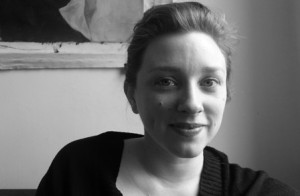1996
By Sara Peters
House of Anansi, 65 pages, $19.95
Reviewed by Jenny Boychuk
Sometimes you need a poet who will lead you into the dark woods without promising to bring you back to safety again. Sometimes you need a poet who will show you the decomposing bear at the edge of the river—and the kids placing red gumdrops along its spine.
Sara Peters is this poet, and this exceptionally brave and fierce first collection left me shaken. Every poem is surprising, though Peters never uses the same trick twice. Often I found myself holding my breath for multiple poems at a time before she turned the knife in my gut. Peters was born in Antigonish, Nova Scotia. She is a graduate of the MFA program at Boston University and was a Stegner fellow at Stanford University from 2010 to 2012.
The first poem, “Babysitters,” sets an appropriately eerie and mysterious tone for the collection. At the end of the poem, I realized the rest of the book would consist of things parents would never talk about in front of their children.
A foreshadowing:
. . . But when she thinks herself
alone, you hear back seat of the car, then
with a trench knife, in the orchard. Secrets thud
like June bugs against screens,
and all you have to do is let them in.
The collection consists of six sections with five poems each, which provides a pleasing sort of symmetrical reading experience. Peters’ controlled lines work best when they slowly release distilled moments and the rhythms provide an almost incantatory effect:
She didn’t mean to braid the horses’ manes and tails
hundreds of times with so much élan—French, four-stranded—
but up was the only unoccupied direction,
so how else to get there? And always
these questions: Who set those fires?
Who broke those mirrors? Is that your blood?
Peters’ poems often have narratives and through them she tells stories of teenage nostalgia, physical attraction, heartbreak, family, religion, nature and the body wearing down. She is skilled with a knife and handles heavy topics with impressive emotional restraint.
From “Bionic”:
My brother’s twenty-two and therefore believes he’s bionic.
He’s home from school,
he’s supposed to look after our mother for the week.
She’s senile and probably dying.
He’s cruel but his cruelty’s probably temporary.
He’s dressed her in a T-shirt that says
I kill everything I fuck // I fuck everything I kill.
She stares into a bowl of cornflake milk;
I carefully cover my breakfast in ketchup.
My brother is funny and blunt.
Whenever I say something sentimental,
or talk—for example—about the ocean,
he says, You know what?
You should write a poem about that.
While there were points where I thought Peters tried to tackle too much within a poem, I won’t soon forget the haunting details and alarming imagery. This is a collection of secrets, a photo album of things not meant to be photographed—and we should be grateful for the chance to look.
Jenny Boychuk has just completed her BFA and is thinking about her future.
